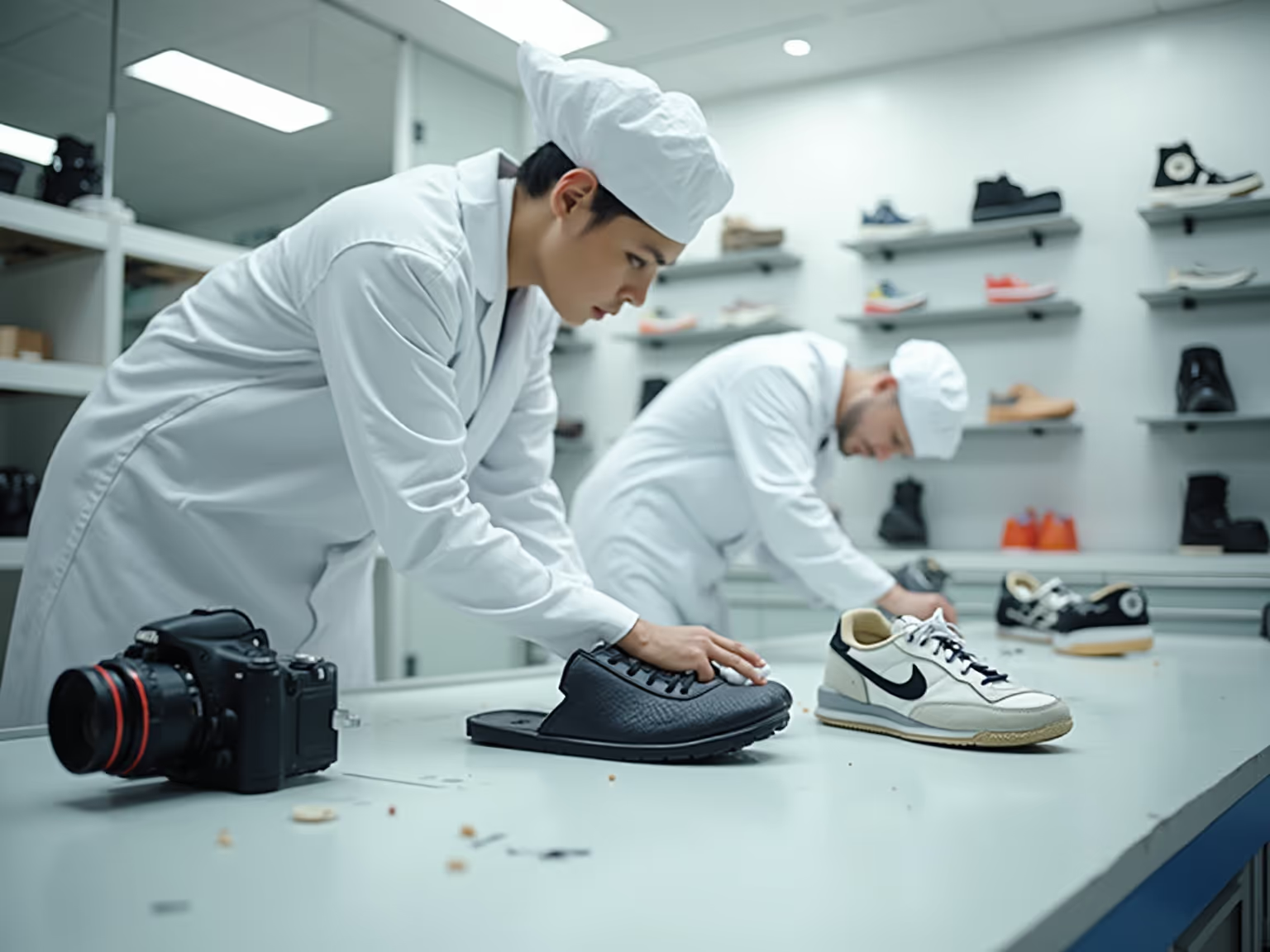Sneaker QC: Ensuring Quality Control in the Retail Industry
Ensure sneaker authenticity & excellence with meticulous Sneaker QC processes.

Introduction
Quality Control (QC) plays a pivotal role in the realm of sneaker retail, ensuring that every pair of sneakers meets the highest standards of excellence. From meticulous inspections of every detail to maintaining brand integrity, QC is essential in the dynamic and versatile sneaker industry. This article explores the importance of QC, common quality control issues in footwear, types of defects in shoe manufacturing, the significance of inspections, steps to implement effective QC, the role of quality control specialists, and the benefits of outsourcing quality control services.
By delving into these topics, we gain insight into the meticulous process of QC and its impact on delivering sneakers that embody durability, comfort, and style.
Understanding Quality Control in Sneakers
In the realm of footwear retail, Quality Control (QC) is not just a process—it's a narrative of excellence that marks every pair of shoes from production to the point of sale. At the heart of QC lies the meticulous inspection of every detail, from the authenticity of the font on the shoe size tag to the condition of the shoe box. A damaged box or incorrect size can signal a counterfeit product, highlighting the importance of rigorous checks to maintain integrity in the footwear market.
The footwear sector, with its dynamic fusion of style and functionality, requires a quality control process that is as adaptable as the items it produces. From the refined elegance of adidas by Stella McCartney to the classic revival of Stan Smith, each sneaker undergoes a journey of scrutiny to ensure that it stands up to the brand's promise of quality and performance.
A telling example of meticulous QC is the scrutiny of box labels, where an incorrect font size can distinguish a genuine product from a fake. This focus on detail reflects the commitment of the sector to not only the aesthetic of the product but also its authenticity. It's a narrative that's become even more relevant in light of Adidas' recent severance with Kanye West, demonstrating how QC extends beyond the product to encompass the brand's values and partnerships.
In the face of evolving sports and lifestyle trends, QC has become a strategic imperative. With more consumers choosing adaptable sports and a shift towards integrated business planning, the sector's approach to QC must be as agile as the market it serves. The latest industry reports show that leaders are optimistic, with a pivot towards innovation and sustainability, driven by consumer preferences for versatile, socially engaging sports.
Through QC, footwear brands are not just offering a product but a promise—a promise of durability, comfort, and style that aligns with the consumer's evolving lifestyle. As we move forward into the future of retail, QC will continue to be the unwavering protector of this pledge, ensuring that every athletic shoe that enters the market is not only a product, but a demonstration of the brand's lasting dedication to excellence.
Common Quality Control Issues in Footwear
Ensuring the high standard of sneakers is paramount in the retail industry, as it directly impacts customer satisfaction and your brand's reputation. Common problems that can occur, even with the most strict measures in place, include stitching flaws, adhesive deficiencies, material inconsistencies, logo misalignment, and size variations. These defects can emerge due to various factors in the production process and need to be identified and remedied promptly.
By implementing a strict inspection process, brands can mitigate these issues. A focus on selecting certified and compliant products, coupled with the expertise of registered safety suppliers, can aid in maintaining high standards. Furthermore, taking inspiration from brands such as BIRKENSTOCK, which upholds foot health and maintains high standards through a vertically integrated manufacturing process, can be advantageous. BIRKENSTOCK's approach — ensuring that over 95% of their products are assembled in Germany and sourcing over 90% of materials from Europe — highlights the importance of transparency and oversight in the production chain.
In addition to following strict standards, integrating technology into footwear designs can greatly enhance functionality and user experience. The trend towards sustainability is also noteworthy, with an increasing demand for footwear crafted from recycled materials and organic fabrics. Customization options that allow customers to personalize their shoe styles, colors, and fits are becoming increasingly popular as well.
Navigating the complexities of the footwear market requires a clear understanding of your niche, market trends, and strategic marketing approaches. By giving priority to ensuring high standards, collaborating with safety specialists, and embracing current market trends, your brand can distinguish itself in the competitive environment of footwear retail.
Types of Defects in Shoe Manufacturing
Ensuring that sneakers meet the highest standards when they hit retail shelves is a meticulous process that identifies a range of potential defects. These defects not only affect the aesthetic appeal, such as uneven dye jobs, scuffs, and scratches but also encompass structural issues like compromised stitching or sole detachment, and functional problems including insufficient cushioning or grip. A strong system for checking is crucial to identify these flaws at an early stage.
The difficulties of conventional control methods encompass slow manual inspections that can disrupt production flow and the subjectivity of human judgment, which can vary and result in inconsistent outcomes. Traditional inspections often miss non-visual defects since they mostly focus on the exterior of the shoe, overlooking the importance of internal structure and comfort.
Brands like BIRKENSTOCK emphasize the importance of maintaining foot health and consistent excellence in their products. Their dedication to function and tradition is evident in their vertically integrated manufacturing process, ensuring every component, including their signature footbeds, meets strict standards. This commitment to excellence at every level has positioned BIRKENSTOCK as a reputable global brand with a heritage dating back to 1774.
To stay ahead in the fast-paced world of manufacturing and remain competitive, shoe companies must perform thorough market analysis and create marketing strategies that emphasize their dedication to high standards. This could attract customers who appreciate excellence in both design and function, establishing a benchmark for assurance of excellence and customer contentment.
Importance of Inspections in Quality Control
Quality control is the lifeblood of the footwear retail industry, where the difference between authentic and counterfeit can hinge on minute details. Take, for instance, the telltale signs of authenticity such as the condition of the shoe box, the size and font on the box label, and the shoe size tag. These elements are meticulously scrutinized during inspections to ensure the legitimacy and quality of the product. As we explore the realm of footwear inspections, we uncover a process where every stitch, seam, and silhouette is examined with a discerning eye. This level of detail is essential, not only for upholding brand standards but also for maintaining consumer trust in an era where the sneaker market is awash with replicas. With notable incidents like the Adidas and Kanye West fallout, where behind-the-scenes misconduct was overlooked for years, the significance of consistent standards and ethical practices has never been more pronounced.
In the retail landscape, this vigilance translates into a proactive approach to control. Retailers are not just selling athletic shoes; they're curating a selection that represents the pinnacle of craftsmanship and style. From the classic aesthetics of Nike's 1980s lineup to Reebok's homage to hip-hop culture, the focus is on delivering a product that meets meticulous standards for excellence and cultural significance. By conducting regular inspections, any deviation from these standards can be identified and rectified promptly, ensuring that the footwear customers ultimately wear is not only stylish and comfortable but also durable and authentic.
This dedication to excellence is reflected in communities like Safety Kicks, where the combination of fashion and safety is paramount. Here, industry-leading safety standards are married with cutting-edge design to create footwear that offers both protection and style. The footwear industry is always changing, with reselling strategies and trends constantly shifting. In this ever-changing market, maintaining high standards remains a consistent element - a cornerstone on which the trust and loyalty of footwear enthusiasts are established. As we look ahead, it's clear that the thorough process of shoe examinations will continue to be a cornerstone of retail excellence, safeguarding not just the integrity of the product but also the very culture it represents.

Steps to Implement Effective Quality Control
Sneaker assurance is a vital element in the footwear industry, pivotal to ensuring not only customer satisfaction but also environmental stewardship. A systematic control regime starts by establishing clear benchmarks for sneakers, covering defect tolerance, material integrity, craftsmanship, and performance metrics.
In the quest for quality, it is vital to rigorously assess suppliers, confirming their adherence to prescribed standards and the dependability of their manufacturing operations. This step is essential in light of the concerning environmental impact of textile production, with the fashion industry responsible for a substantive 4 percent of global greenhouse gas emissions as reported by McKinsey, and the World Bank noting that it accounts for a staggering 93 billion cubic meters of annual water usage.
Next, it is imperative to carry out meticulous inspections of the raw materials and components going into sneaker production. This proactive measure can significantly mitigate the risk of producing substandard footwear, which is particularly important given the current climate of heightened consumer awareness around product life cycles and product excellence.
Oversight during the manufacturing process is equally critical. Regular inspections at various stages of production facilitate the early detection of any issues, enabling timely corrective measures. This approach is in line with insights from experts in the field, who emphasize the changing consumer preferences towards personalized products, competitive pricing, and prompt delivery—factors that force manufacturers to refine their operational strategies.
The last stage prior to sneakers reaching the retail market involves thorough inspections of the finished product, ensuring adherence to all protocols of excellence. This is in sync with the broader industry trend towards enhanced product durability and reduced return rates, as elucidated by a team of data scientists intent on leveraging data to improve product life cycles.
To ensure the dedication to excellence, a culture of continuous enhancement is essential. By analyzing data on the standard of the sneakers, identifying patterns, and making well-informed adjustments, sneaker manufacturers and retailers can enhance their processes of ensuring high standards, meeting and even exceeding the expectations of consumers and environmental advocates alike.
Furthermore, the fashion sector's scenery is characterized by uncertainty, as suggested by the 'State of Fashion' report by The Business of Fashion and McKinsey & Company. With projected growth slowing to 2 to 4%, driven by a resurgence in global tourism and the advent of generative AI, the requirement for strict assurance becomes even more pronounced amidst these fluctuating market conditions.
Essentially, these measures constitute the foundation of a strong system for ensuring the standards in the footwear sector, one that not only meets the expectations of consumers but also tackles the urgent environmental issues linked to the wider textile industry.

Role of Quality Control Specialists in Footwear
In the complex realm of footwear retail, control specialists are invaluable, offering the careful supervision needed to deliver products that resonate with consumer expectations and maintain brand integrity. Their multifaceted role encompasses thorough inspections and detailed data analysis, allowing them to pinpoint trends and implement corrective measures promptly. Collaborating effectively with manufacturers, suppliers, and retail outlets, these experts guarantee that the footwear that reaches the market maintains consistent standards, thus protecting the consumer experience and strengthening the brand's position in a fiercely competitive retail environment.
Drawing parallels to the hospitality industry, Martin Faist of Absolute Hotel Services exemplifies the profound impact of assurance. His transition from Group Director of Food and Beverage to Vice President of Quality Assurance underscores the evolution and expansion of assurance beyond a single department, reflecting the complexities of footwear quality management which extends across various stages of production and distribution.
Innovations like Reebok's entry into the digital sphere with 'Reebok Impact' also highlight the requirement for control specialists to stay updated with emerging technologies and consumer trends. As footwear brands explore new horizons in product engagement, the duty to uphold excellence in both tangible and virtual domains becomes progressively important.
Furthermore, the market for reselling footwear offers valuable information about the significance of genuineness and excellence. As discerning customers and resellers examine every detail, from the shoe box condition to the accuracy of font on size tags, the role of specialists in ensuring high standards becomes critical in preserving the trust and satisfaction of shoe enthusiasts.
With a wealth of experience and expertise, these professionals are responsible for not only ensuring the physical excellence of athletic shoes but also nurturing the brand's reputation, much like a chef's commitment to culinary perfection or a hotel's dedication to guest satisfaction. In a field where every stitch matters and every material choice can make or break a brand, specialists in assuring excellence stand as the guardians of a shoe's journey from conception to consumer.

Benefits of Outsourcing Quality Control Services
Taking advantage of the knowledge and skills of specialized companies for control of footwear standards can greatly benefit manufacturers and retailers. With experienced experts well-versed in the complexities of the footwear industry, these firms bring a level of expertise that guarantees thorough checks. This expertise becomes essential, especially in regions like North America, where the sneaker market thrives on a robust sportswear culture and high consumer expectations shaped by trends and lifestyle influences.
Cost-effectiveness is another convincing reason to delegate assurance. Instead of bearing the financial burden of establishing an in-house department, manufacturers and retailers can save significantly by partnering with external agencies. This strategy aligns with the growing need for fiscal prudence in the fashion industry, as brands strive to optimize costs while maintaining high-quality standards.
The flexibility offered by outsourcing is particularly valuable for scaling operations to match production peaks and valleys, a factor that aligns with the dynamic nature of the footwear market. This flexibility ensures that control processes are always in sync with production volumes, avoiding bottlenecks and ensuring timely product deliveries.
Unbiased assessments are crucial for maintaining credibility in the sneaker market. External experts offer unbiased assessments, void of any internal biases, which is vital in a field where authenticity and excellence are of utmost importance. Scrutinizing details like box condition, label fonts, and shoe size tags are part of the meticulous process that distinguishes genuine products from counterfeits, a skill that these external experts have honed.
Outsourcing the monitoring process also enables brands to allocate their internal resources more effectively, concentrating on core business activities. This aspect is especially relevant in a competitive landscape where innovation and marketing prowess, as demonstrated by giants like Nike and Adidas, are key to capturing consumer attention and loyalty.
By incorporating external quality control into their operational strategy, sneaker manufacturers and retailers can not only enhance their product quality but also position themselves favorably in a market where customer satisfaction is closely tied to brand success. The practice aligns with current industry trends, such as the embrace of nearshoring to reduce costs and lead times, and the push for transparency and accountability throughout the manufacturing journey.
Conclusion
In conclusion, Quality Control (QC) is vital in the sneaker retail industry to ensure that every pair of sneakers meets high standards. QC plays a crucial role in maintaining brand integrity and consumer trust by meticulously inspecting every detail. It helps mitigate common quality control issues like stitching imperfections and material inconsistencies.
The versatility of the sneaker industry demands a flexible QC process that aligns with the dynamic blend of fashion and performance. Inspections are essential in upholding brand standards and delivering products that resonate with consumer expectations. QC specialists provide meticulous oversight and implement corrective measures to ensure unwavering quality.
To implement effective QC, brands need to set quality benchmarks, assess suppliers, conduct meticulous inspections, and analyze quality control data. Outsourcing QC services can bring expertise, cost-efficiency, flexibility, and objective evaluations, allowing brands to focus on core activities.
In a competitive landscape, QC is crucial for delivering sneakers of high quality and upholding brand reputation. By prioritizing QC, brands can position themselves favorably and meet consumer expectations while addressing environmental concerns. QC is the cornerstone of retail excellence, safeguarding the integrity of the product and the culture it represents.
Ensure the highest quality for your sneakers with our meticulous QC specialists.



